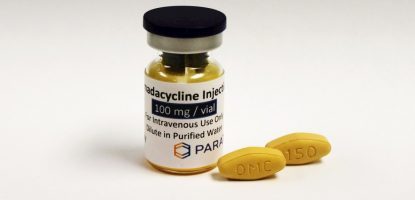- Home
- Editorial
- News
- Practice Guidelines
- Anesthesiology Guidelines
- Cancer Guidelines
- Cardiac Sciences Guidelines
- Critical Care Guidelines
- Dentistry Guidelines
- Dermatology Guidelines
- Diabetes and Endo Guidelines
- Diagnostics Guidelines
- ENT Guidelines
- Featured Practice Guidelines
- Gastroenterology Guidelines
- Geriatrics Guidelines
- Medicine Guidelines
- Nephrology Guidelines
- Neurosciences Guidelines
- Obs and Gynae Guidelines
- Ophthalmology Guidelines
- Orthopaedics Guidelines
- Paediatrics Guidelines
- Psychiatry Guidelines
- Pulmonology Guidelines
- Radiology Guidelines
- Surgery Guidelines
- Urology Guidelines
Omadacycline for treatment of community-acquired pneumonia

DELHI: Omadacycline, a new once-daily aminomethylcycline antibiotic agent, is non-inferior to moxifloxacin for the treatment of community-acquired bacterial pneumonia in adults, according to a new study published in the New England Journal of Medicine.
Community-acquired pneumonia (CAP) is one of the most common infectious diseases and is an important cause of mortality and morbidity worldwide. Typical bacterial pathogens that cause CAP include Moraxella catarrhalis, Haemophilus influenzae, and Streptococcus pneumoniae.
In this double-blind trial, 774 pneumonia patients were randomized to receive intravenous treatment with either omadacycline (100 mg every 12 hours for two doses, then 100 mg every 24 hours; n=386; median age, 61 years). A transition to oral omadacycline (300 mg every 24 hours) or moxifloxacin (400 mg every 24 hours), respectively, was allowed after 3 days; the total treatment duration was 7 to 14 days. The primary endpoint was an early clinical response, defined as survival with improvement in at least two of four symptoms (cough, sputum production, pleuritic chest pain, and dyspnea) and no worsening of symptoms at 72 to 120 hours, without receipt of rescue antibacterial therapy.
Also Read: Steroids reduce ICU stay and mortality risk in severe community-acquired pneumonia
Key findings of the study include:
- Omadacycline was noninferior to moxifloxacin for early clinical response (81.1% and 82.7%, respectively) and the rates of investigator-assessed clinical response at the post-treatment evaluation were 87.6% and 85.1%, respectively.
- Adverse events that emerged after treatment initiation were reported in 41.1% of the patients in the omadacycline group and 48.5% of the patients in the moxifloxacin group; the most frequent events were gastrointestinal (10.2% and 18.0%, respectively), and the largest difference was for diarrhea (1.0% and 8.0%).
- Twelve deaths (8 in the omadacycline group and 4 in the moxifloxacin group) occurred during the trial.
Also Read: Updated Guideline for Antibiotic Use in Adults with Community-acquired Pneumonia
“These results are consistent with the observed stabilization of vital signs and the expected time course for the initial response to therapy,” researchers said.
“In our trial, extensive microbiologic testing identified a bacterial pathogen in 50 percent of patients; however, in the real world, probable causative pathogens in community-acquired bacterial pneumonia are identified in less than 10 percent of cases,” researchers noted. “Therefore, empirical therapy for community-acquired bacterial pneumonia must be chosen with common respiratory pathogens and contemporary local susceptibility taken into consideration.
“The spectrum of activity of omadacycline against typical and atypical respiratory pathogens, the absence of cross-resistance with other antibiotic classes, and the efficacy of the drug shown in our trial suggest a potential role in the treatment of community-acquired bacterial pneumonia in an era of increasing antimicrobial resistance,” they added.

Disclaimer: This site is primarily intended for healthcare professionals. Any content/information on this website does not replace the advice of medical and/or health professionals and should not be construed as medical/diagnostic advice/endorsement or prescription. Use of this site is subject to our terms of use, privacy policy, advertisement policy. © 2020 Minerva Medical Treatment Pvt Ltd